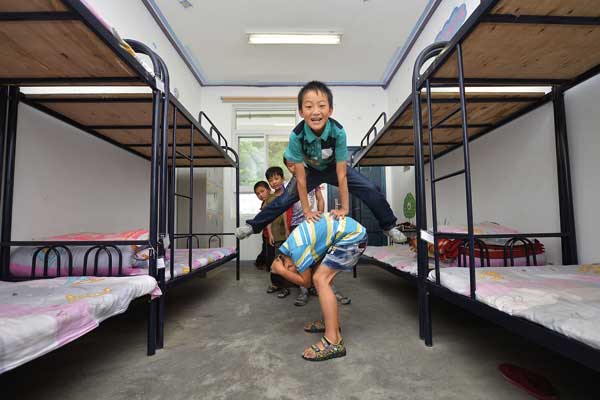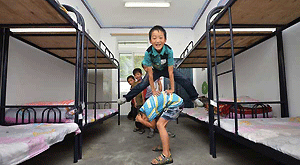Rural Boarding Schools Need Dorm Managers
China Daily, August 21, 2013 Adjust font size:
The absence of dormitory managers in rural boarding schools is adversely affecting the quality of education in those schools, a report said.
The report, which focuses on elementary education in China's poor rural areas, was released on Aug 15 in Beijing by the China Foundation for Poverty Alleviation and the Heren Charitable Foundation.
The report said that only 45 of the 101 boarding schools surveyed hire specialized managers to look after children and manage the dormitories.
About 55 percent of teachers also serve as managerial staff, the report said.
"Many schools can't afford to employ specialized staff to manage the dormitories, and this work is often done by instructors or head teachers, which affects the quality of education," said Wang Liping, the deputy secretary-general of the Heren Charitable Foundation.
The study conducted interviews with 451 teachers and 1,382 students from 21 provinces in poor rural areas.
The report found that about 40 percent of the students choose to live in their schools, and 15.3 percent of those students are dissatisfied or very dissatisfied with their accommodations.
The report also said some schools distribute the dormitory assignments randomly, placing students of different ages together.
Wang said the performance of teachers suffers when they also must serve as dormitory managers.
"These teachers are often busy with their daily teaching and correcting homework," she said.
"How can they find time to enjoy life and deal with problems in the students' lives?"
In addition, those teachers haven't received dorm-management training, so they might make mistakes that could create safety issues, she added.
The report said children live in dormitories because their homes are far from school, their parents work in other cities and can't look after them, or the students want a better education.
Chen Yunsheng, principal at the central primary school in Baiyun, in Wulong County, Chongqing, told China Daily that about 60 of the school's 300 students live in the school dormitory, but they have only one teacher, who is older than 50, to manage them.
"The dormitory was converted from a classroom and the bathroom was added later. Each dorm has 20 to 30 students. Living conditions are obviously a problem," Chen said.
He said the school once considered hiring others to manage the dormitory, but doing so would have been too expensive.
Another principal, from the central primary school in Qiuba, in Luanchuan Country, Henan Province, said they didn't have specialized boarding management personnel. Only two teachers manage the 210 students who live in the dormitory.
However, he said, the teacher is responsible and the school didn't consider hiring new management staff.
Both of the two groups that conducted the survey appealed to schools to hire more specialized people to manage dormitories who would have time to talk to the children and offer them guidance while reducing the potential safety hazard. In addition, the central government needs to invest more in rural education, the groups said.
Wang Lin, an expert from the Chinese Society of Education, doesn't support having elementary school children living in dormitories at all. "They should stay with their mothers and get care and affection from them," she said.
Wang said the specialized dormitory management staff could also tell stories, sing songs and play games with the children to enrich their lives and compensate for being without their parents.
|
|
|
Pupils play games in their dormitory in July in Liuba County, northwest China's Shaanxi Province. [Xinhua] |



